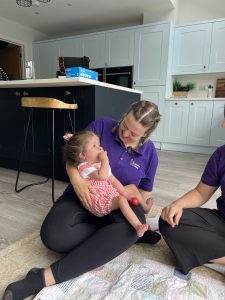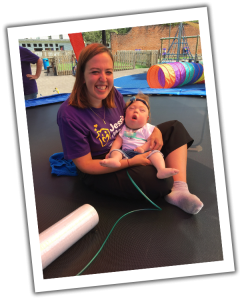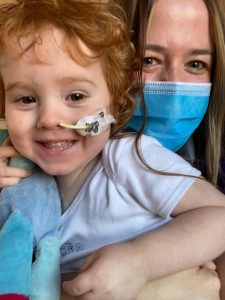In this special interview, we’re diving into the heart of Jessie May, Children’s Hospice at Home, and the important role of its End of Life Team Leader, Lois Cox. This conversation gives you an inside look at the caring and dedication that define this key role, making sure each child and family gets the support they need during their toughest times.




Tell us about your role at Jessie May: what was your previous role, and what do you do now?
I am the End of Life Team Leader at Jessie May. Previously, I worked as a band five nurse in the care team. My current role is entirely new for Jessie May so it’s a learning experience all round! I coordinate the end of life care for the children on our caseload who are reaching that stage, supporting staff to be able to deliver the best care. I also help coordinate our service’s involvement in a pilot project called the Starling Service, offering 24/7 end-of-life care at home.
Why did the ‘End of Life’ Team Leader role appeal to you?
Because although we get many chances to get care right, we only get one chance to get end of life right. I’m passionate about ensuring that all children and families receive excellent quality care at end of life and are given choices about what matters to them.
How has your experience at Jessie May contributed to this role?
My experience has shown me firsthand the difference we can make at the end of life and what improvements we can implement. It’s given me insights into what’s necessary to deliver the best end-of-life care
What’s one of the most significant things you’ve learned that will benefit you in this role going forward?
That every child and family is different. What’s significant to one family, may not matter to others, and the most valuable thing we can offer is care and kindness, which makes such a difference.
How would you describe the importance of this role?
I think this role is really important! Ensuring parity of care for families, and enabling our nurses to feel confident and competent to offer that care is key. My role enables care to be coordinated and nurses to be supported in delivering care.
Can you provide an example of the end of life care that Jessie May offers and how it benefits families?
What would you like to achieve in this role going forward? I would like all nurses at Jessie May to feel confident in delivering excellent quality end-of-life care to all families who need it. I would love for us to have a coordinated approach to delivering care in partnership with other agencies, ensuring that all children and families feel supported during their most challenging moments.
Can you provide an example of the end of life care that Jessie May offers and how it benefits families?
During the pandemic, a child on our Jessie May caseload had a rapid decline in their health, meaning they were in hospital; they were identified as reaching the end of their life. The family really wanted to be at home, and Jessie May nurses worked hard to ensure that the parents’ voices were heard when deciding on a place of care for their child. Unfortunately, it was deemed not possible for the family to transfer home, so they instead transferred to the children’s hospice. The family were really keen to have continuity of care and for nurses who knew them well to be involved at the end of life. We accompanied them to the hospice and developed a rota for over the weekend to work with the hospice and look after the family there.
I had the privilege of working on the night the child died and was able to care for the child and their family. Three years on, Jessie May still support the family, who talk often about the importance of having people they knew caring for them at the time of their child’s death, highlighting what a positive impact Jessie May made that weekend.
What would you like to achieve in this role going forward?
Going forward I would like all nurses at Jessie May to feel confident to deliver excellent quality end of life care to all families who need it. I would love for us to have a coordinated approach to delivering care in partnership with other agencies, and for all children and families to feel held in their hardest moments.
How does it feel to be a leader?
Initially, it was a little daunting, but I feel like I’m getting the hang of it! It’s important to me to support our team and enable everyone to have a voice. I’m actively gathering ideas for areas of the service I’m involved with.
Why do you think being an End of Life Team Leader is important to your team and families?
It’s an area of nursing that can be really scary and people often feel apprehensive about delivering end of life care. I think having a team leader in this role is important to ensure that the whole team feels supported and to ensure that everyone knows that the families they care for are getting the best care.
What would you like to say to families considering seeking support?
Please do get in touch if you need us! We’re a friendly bunch and we’re here to help; we love to meet new families and work with you to be able to offer a service that meets your needs.
What message would you like to convey to supporters?
I’d like to say a huge thank you to our supporters, we truly couldn’t do it without you. Your support is enabling the children and families we look after to access care in the place that they are most comfortable – their home – and that is invaluable.
Lastly, how do you think your colleagues would describe you?
I would hope that my colleagues would describe me as approachable, kind and a problem solver. But they’d probably just say ‘loud and thinks she’s funnier than she is!’



